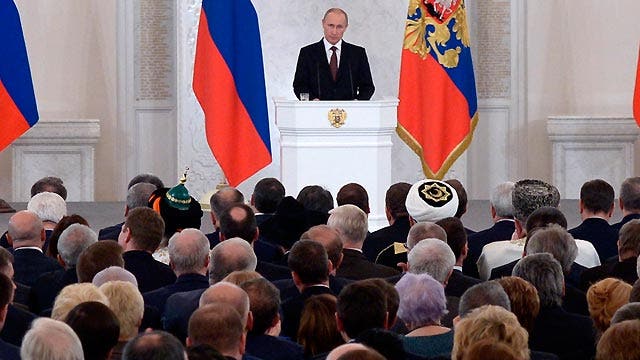Members of an American documentary film crew, visiting the southeastern Ukrainian city of Mariupol last week and stumbling upon a pro-Russian rally downtown, narrowly escaped with their lives as the crowd cursed and chased the Americans and violently attacked their minivan. The vehicle barely got away.
Such views are surely not held uniformly across Ukraine, but among ethnic Russians, and in the heart of the former Soviet Union, a palpable anti-American sentiment is discernible -- and it is, to some extent, the product of determined efforts by Russian President Vladimir Putin and the Kremlin apparatus he controls.
"Friends of mine who have been in Moscow for the past, say, two years tell me you cannot understand the amount of propaganda, anti-U.S. propaganda, that is being fed to the Russian people on Russian television -- nothing like it, unprecedented," said Daniel Henninger, deputy editorial page editor of the Wall Street Journal, in an appearance on Fox News' "Happening Now." "They didn't even do this sort of thing back during the Cold War."
There is some evidence the campaign is working. The Levada Center, an independent pollster in Russia, surveyed a sample of more than 1,600 people there earlier this month and found 56 percent of Russians viewing the United States negatively. That figure is the highest it has been since the polling started, and up a full 12 percentage points since January. In 1990, by contrast, only 7 percent of Russians viewed America in negative terms.
"Every dictator needs an enemy in order to mobilize his population," said Max Boot, senior fellow at the Council on Foreign Relations and author of "Invisible Armies: An Epic History of Guerrilla Warfare," in an interview with Fox News. "And for Putin, the most convenient enemy is, of course, the United States and the West, more broadly. And what he basically does through his propaganda machine is to blame us for everything that Russians don't like about their own country. He tries to tell his own people that the weakness and the impoverishment of Russia is due to a plot by the West against the Russian people.
"He's certainly tapping into this vein of resentment and bewilderment over the loss of status associated with the collapse of the Soviet Union. And he's giving Russians -- no question -- a certain dose of pride back, by saying, 'We count for something. We are on the march again. We are taking over Crimea.'"
Addressing the Russian Federal Assembly on Tuesday, marking the formal annexation of Crimea, Putin, as usual, had some choice words for the United States. "In the case of Ukraine, our Western partners have crossed the line," he told lawmakers. "Western partners, led by the United States, prefer not to be guided by international law in their practical policies, but by the rule of the gun. ... They have come to believe in their exceptionalism and their sense of being the chosen ones. That they can decide the destiny of the world, that it is only them who can be right."
Analysts said the Ukraine crisis has given Putin an opportunity to project strength on the world stage, and thereby rally his citizenry, even as the value of the Russian ruble has dropped, by the estimate of senior U.S. officials, by 8.3 percent over the same time last year.
"The sense of catharsis and that 'We are back' and that 'We are a major power' is running through his veins like ... heavy steroids or something," Andrew Kuchins, senior fellow and director of the Russia and Eurasia Program at the Center for Strategic and International Studies, told Fox News.
The Levada Center survey bolsters that view, as well. It found 63 percent of Russians seeing their country as a "great power," a measurement higher than any point in the last 15 years.





















